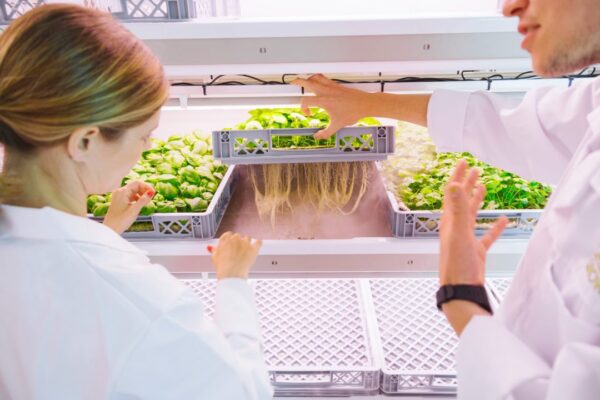
£8m for UK smart farming projects
The UK Research and Innovation (UKRI) has announced £8m (€10m) for a Farming Innovation Programme.
A feasibility projects competition was created to back smart farming projects, aid research and collaboration, and encourage collaboration across the UK’s farmers, growers and foresters. Projects were required to demonstrate the benefits the concept would generate, as well as how collaboration between farmers, businesses and researchers could be enhanced as a result.
Over 20 projects were successful with a range of ideas from using ultrasonics for indoor farming to robotic courgette, broccoli and lettuce harvesting and growing systems. Lettusgrow, Muddy Machines, Eyre Trailers, Earth Rover and Performance Projects all developed new concepts for harvesting, from combine harvester vehicles themselves, to broccoli and soft fruit.
Related articles
- €8m boost for smart agriculture robots
- LettUs Grow teams for greenhouse technology trial
- AI for pesticide-free smart farming weed removal
“The breadth of areas covered by the successful projects clearly demonstrate just how many issues there are to tackle when it comes to innovating the UK’s food sector,” said Katrina Hayter, challenge director for the transforming food production challenge at UKRI.
“What these projects have shown is not simply a standalone solution, but a concept that forms part of a wider picture of improving the overall sustainability and productivity in farming. Once again collaboration has been key, with new technology combining with research and in-the-field expertise to help drive these concepts forward.”
UKRI has also announced the opening of the research starter round two competition offering up to £1 million.
The Advanced Aeroponics project is led by Lettus Grow in Bristol to design and prototype manufacture an Advanced Aeroponic rolling bench system. This system will be used for two trials set out to demonstrate productivity increase, flexibility of growing and the improved resource efficiency of using ultrasonic sound to create a mist of water and nutrients for indoor farming, This avoids clogging nozzles and allows more accurate use of water. As the mist is applied only to the root zone, the growing medium remains dry, so pest and disease pressure is also minimised.
“Trials will be conducted with a commercial partner which aim to demonstrate the feasibility of the Bench within a large-scale commercial greenhouse setting,” said Ben Crowther, co-founder and Chief Technology Officer at LettUs Grow. “With our unique, patent-pending aeroponic technology, crop growth rates can be considerably accelerated, with previous trials demonstrating an increase of between 20 and 200 percent, compared to hydroponic systems. This is because plant roots have greater access to oxygen, resulting in healthier plant root stock and faster growth cycles.”
During the 21-month feasibility study, part one of trials will take place at CHAP’s Vertical Farming Development Centre at Stockbridge Technology Centre, to create a point of reference for the Aeroponic Rolling Bench, compared to commercial hydroponic rolling benches.
Part two of trials will be at a commercial greenhouse, to demonstrate the commercial viability and value at scale.
“By deploying Aeroponic Rolling Benches within CEA, the lifetime return on investment can triple, whilst reducing the carbon footprint of fresh produce production by 50 per cent,” said Dr Harry Langford, Innovation Network Lead at commercial partner CHAP.
Project High Speed Header (HSH) is developing the next generation of tractor-mounted combine harvesting implement. This simple innovation significantly reduces harvester mass enabling a flexible tractor mounted system.
A robotic courgette harvester by Muddy Machine aims to develop a completely novel class of agricultural machine that can reliably replace manual labour to address the needs of UK growers. The company has already built and field-tested an autonomous asparagus harvest robot whose platform can be used in this project.
The SCARLETT (scalable, structured and resource efficient indoor robotic harvesting of lettuce) project led by Jepco (Glebe) aims to simplify the harvesting workflows into well-defined tasks where robots can be deployed to perform ‘repetitive, laborious’ jobs with high efficiency by redesigning of harvesting processes and embedding of robotics or artificial intelligence (AI).
An automated selective broccoli harvesting system developed by Earth Rover aims to take a proof of concept broccoli harvesting machine to infield testing and a pre-production prototype. The new automated approach will harvest the whole plant, opening up the potential to create valuable and nutritious plant-based foods from what was previously seen as crop waste.
The Grain lab on a robot project by Crover will develop a novel non-contact sensor for non-contact grain analysis, able to detect specific molecular compounds within a radius of up to a few tens of centimetres.
This is based on a novel miniaturised sensing technology will be integrated onto the CROVER robot, the world’s first ‘underground drone’. This ‘swims’ in grain bulks and is at the core of the CROVER autonomous Grain Storage Management system.
www.ukri.org.uk; www.chap-solutions.co.uk; www.lettusgrow.com
Related articles
- Dutch agbot startup in major deal for rollout
- UK agtech startup raises £1.2m
- European tech combines LoRa and cellular for smart farming
- Bosch teams for smart farming joint venture
Other articles on eeNews Europe
- Bosch launches €250m startup fund
- AI drives big data analytics for chip design
- Apple boosts transistor count in 5nm M2 chip
- $400m RISC-V design centre for Barcelona
- €140m 3D chip research centre opens in Dresden
 If you enjoyed this article, you will like the following ones: don't miss them by subscribing to :
eeNews on Google News
If you enjoyed this article, you will like the following ones: don't miss them by subscribing to :
eeNews on Google News


